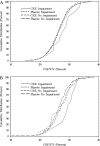Brain volumes, cognitive impairment, and conjugated equine estrogens
- PMID: 19729392
- PMCID: PMC2773813
- DOI: 10.1093/gerona/glp128
Brain volumes, cognitive impairment, and conjugated equine estrogens
Abstract
Background: Postmenopausal conjugated equine estrogens (CEE) therapies increase the risk of cognitive impairment in women aged 65 years or older and are associated with smaller regional brain volumes; however, the link between these two phenomena has not been established.
Methods: Standardized magnetic resonance imaging was performed on 1,403 women, 1-4 years after they had participated in randomized placebo-controlled clinical trials of CEE-based therapies. Women included in this report were aged 65-80 years and free of dementia and mild cognitive impairment (MCI) when originally enrolled in the trials, which lasted an average of 4-6 years and were conducted at 14 academic U.S. medical centers. The associations that regional brain volumes and ischemic lesion volumes had with the development of cognitive impairment (i.e., dementia or MCI) were contrasted between treatment groups using analyses of covariance.
Results: Fifty-three women developed MCI or probable dementia during follow-up. Among women who had been prescribed CEE-based therapies, cognitive impairment was associated with relatively smaller hippocampal (p = .0002) and total brain volumes (p = .03). Qualitatively, these associations appeared to be independent of their level of pretreatment cognitive function. Among women who had been prescribed placebo, these relationships were not evident; instead, cognitive impairment was associated with greater ischemic lesion volume in the frontal lobe (p = .007) and overall (p = .02).
Conclusion: A mechanism by which CEE-based postmenopausal hormone therapy induces cognitive impairment appears to be through increased brain atrophy.
Figures


References
-
- Shumaker S, Legault C, Rapp S, et al. The effects of estrogen plus progestin on the incidence of dementia and mild cognitive impairment in postmenopausal women: the Women’s Health Initiative Memory Study. JAMA. 2003;289:2651–2662. - PubMed
-
- Shumaker SA, Legault C, Kuller L, et al. Conjugated equine estrogens and incidence of probable dementia and mild cognitive impairment in postmenopausal women: Women’s Health Initiative Memory Study. JAMA. 2004;291:2947–2958. - PubMed
-
- Espeland MA, Rapp SR, Shumaker SA, et al. Conjugated equine estrogens and global cognitive function in postmenopausal women. JAMA. 2004;291:2959–2968. - PubMed
Publication types
MeSH terms
Substances
Grants and funding
LinkOut - more resources
Full Text Sources
Other Literature Sources
Medical

